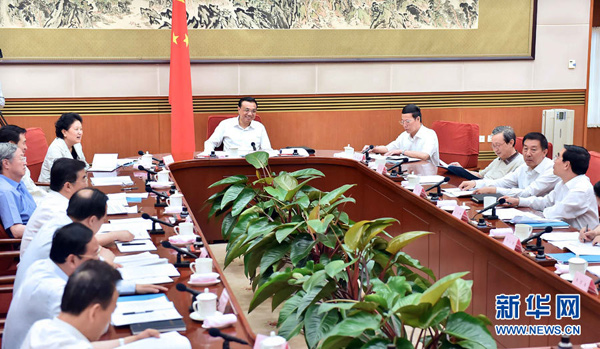李克强呼吁落实改革实施
BEIJING, June 6 (Xinhua) -- Acknowledging downward pressure on the economy, Chinese Premier Li Keqiang on Wednesday urged central and local authorities to actively and fully implement reform policies.
"To achieve the development goals for 2014, we should better mobilize efforts from both the central and local authorities," Li said at an economic conference.

Premier Li urges reform implementation
While noting China's economic growth, employment and inflation are all within a proper range, Li said risks and challenges are not to be overlooked as downward pressure remains "relatively high".
China's economy grew at its weakest pace in 18 months in the first quarter, expanding by 7.4 percent, lower than the 7.5 percent target, but there are signs that the economy may be gaining strength. Growth in the manufacturing sector continued to accelerate in May, hitting a five-month high that pointed to a stabilizing economy.
Li stressed that development remains the major task, and urged authorities to implement policies already in place and make targeted moves to address new problems to achieve the year's economic and social goals.
Local authorities should continue to streamline functions and delegate power to lower levels to facilitate investment, job creation and employment, he said.
"The main engine is the market, and the government should play a guiding and helping role," Li said, urging more support to emerging industries, the private economy and micro-enterprises.

Premier Li urges reform implementation
To support the faltering economy, the central government has unveiled a string of measures to try to steady growth near its target of 7.5 percent without disrupting plans to restructure the economy or worsening problems of overcapacity and debt.
These so-called "targeted" measures include cutting reserve requirement ratios (RRR) for rural banks, speeding up railway and public housing construction, and tax breaks for small businesses.
The State Council earlier this month announced additional policy easing measures, promising to increase "targeted" monetary and credit easing, lower corporate financial burdens and accelerate policy implementation.
More specifically, China will lower RRR for banks whose lending is geared toward the real economy, especially small businesses and the farming sector, according to a statement issued after a cabinet meeting.
To ensure the policies are properly carried out, the State Council will start a comprehensive inspection, and those found neglectful of their duty will be held responsible.







